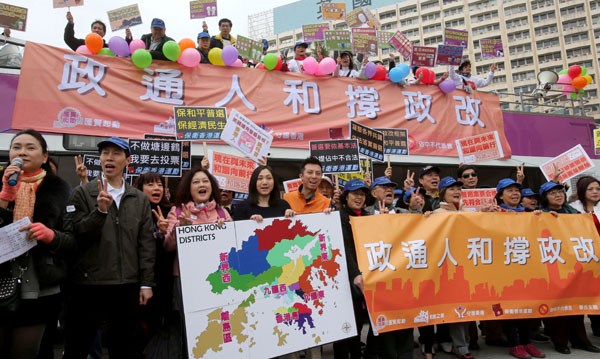 |
| Government supporters outside a ferry pier in Hong Kong prepare to join a parade showing their backing for the election reform decision of the country's top legislature. Edmond Tang / China Daily |
Turnout for the first major march in Hong Kong organized by the opposition camp after the illegal "Occupy" protest was much lower than expected, as the government called for a rational, pragmatic and inclusive attitude to forge consensus for election reform.
Slogans, symbols and themes associated with the illegal protests again flooded the main streets of Hong Kong on Sunday, although in a much calmer and more law-abiding manner than the earlier protests. Unlike the blockades cleared in December, the Sunday march had been approved by authorities.
Hong Kong police estimated that up to 8,800 protesters took part in the march, which stretched along main roads from the Causeway Bay district to the Central district on Hong Kong Island on Sunday. The organizer, Civil Human Rights Front, estimated the turnout at 13,000.
Both figures were considerably lower than those expected by the organizer. In earlier filings with the local police, the advocacy group said it expected to see a turnout of 50,000, which prompted a heavy police presence and barriers along the route of the march.
The first protesters left Victoria Park in Causeway Bay after 2 pm and began a sit-in on Charter Road in the Central district two hours later.
The crowd thinned out after dark, and the organizer wrapped up the assembly after 7 pm.
In a statement, the Hong Kong government called on the community to adopt an "accommodating, rational and pragmatic" approach, as well as an inclusive attitude, to express views and forge consensus to deliver the promise of universal suffrage.
A public consultation is underway in Hong Kong with the goal of electing the next chief executive by universal suffrage in 2017. The Standing Committee of the National People's Congress, based upon a report by the incumbent city chief, laid out a blueprint in August for the election.
Polls had indicated that the reform package will likely be favored by the majority in Hong Kong. Advocacy group Defend Hong Kong Campaign, for instance, held a parade on Sunday morning to underscore strong backing for the decision of the country's top legislature.
The opposition camp has vowed to block the reform package at the city's Legislative Council. According to the Basic Law, the reform package could pass only if a handful of opposition lawmakers switch sides.
Hours before the Sunday march, Lam Woon-kwong, a former official and now convener of non-official members in Hong Kong's Executive Council, renewed his call to the opposition to work with the central authorities.
No matter which side one's political party has chosen, he told a radio program on Sunday, any member working in the establishment must find a way to work with the central authorities to get things done. "Without that, anything is merely empty talking," he said.
